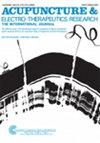The Effectiveness and Safety of Chemical Drugs Combined with Acupuncture for Alzheimer’s Disease: A Systematic Review and Meta-Analysis
IF 0.4
4区 医学
Q4 INTEGRATIVE & COMPLEMENTARY MEDICINE
Acupuncture & Electro-Therapeutics Research
Pub Date : 2021-01-01
DOI:10.3727/036012921x16321477053881
引用次数: 1
Abstract
Introduction: Acupuncture has been applied with chemical drugs to treat Alzheimer’s disease (AD) in the clinic. Whether such combination is effective and safe should be studied although it is recommended by some researchers.Methods: To explore the effectiveness and safety of acupuncture combined with the chemical drugs for AD, databases like PubMed, Web of Science were searched to retrieve randomized controlled trials (RCTs) on AD treated with acupuncture and chemical drugs to perform meta-analysis. The risk of bias in each study was assessed using the Cochrane Risk of Bias scale. Meta-analysis was performed using RevMan 5.3.Results: Five studies were included in which only donepezil combined with acupuncture was evaluated. Acupuncture combined with donepezil showed a significant difference in effectiveness rate [RR=1.45, 95% CI (1.19, 1.77), P=0.0002] compared with donepezil. On the comparison of mini-mental state examination (MMSE) score and Alzheimer's disease assessment scale cognitive subscale (ADAS-Cog) score there was no difference. However, after one trial with severe AD patients was removed, acupuncture combined with donepezil showed better effect than donepezil alone. Conclusion: Acupuncture combined with donepezil could work on AD at the early stage or with mild AD, implying that acupuncture could be a complementary therapy for AD at early stage or with mild condition. Besides, scalp acupuncture seems to be more effective on improving cognitive function. However, this conclusion must be considered cautiously, given the small sample size and lack of trials of high quality. Therefore, more high-quality, multicenter, prospective, RCTs with large sample sizes are needed to further clarify the effect of acupuncture combined with chemical drugs for AD.化学药物联合针灸治疗阿尔茨海默病的有效性和安全性:一项系统综述和meta分析
针灸已被应用于临床治疗阿尔茨海默病(AD)的化学药物。尽管一些研究者建议这样做,但这种组合是否有效和安全还有待研究。方法:为探讨针刺联合化学药物治疗AD的有效性和安全性,检索PubMed、Web of Science等数据库,检索针刺联合化学药物治疗AD的随机对照试验(rct),进行meta分析。使用Cochrane偏倚风险量表评估每项研究的偏倚风险。采用RevMan 5.3进行meta分析。结果:纳入了5项仅评价多奈哌齐联合针灸的研究。针刺联合多奈哌齐与多奈哌齐相比,有效率有显著差异[RR=1.45, 95% CI (1.19, 1.77), P=0.0002]。最小精神状态检查(MMSE)评分与阿尔茨海默病评估量表认知亚量表(ADAS-Cog)评分比较无差异。然而,在一项针对重度AD患者的试验中,针刺联合多奈哌齐的效果优于单用多奈哌齐。结论:针刺联合多奈哌齐对早期或轻度AD均有疗效,提示针刺可作为早期或轻度AD的补充治疗。此外,头皮针灸似乎对改善认知功能更有效。然而,考虑到样本量小,缺乏高质量的试验,必须谨慎考虑这一结论。因此,需要更多高质量、多中心、前瞻性、大样本量的随机对照试验来进一步阐明针灸联合化学药物治疗AD的效果。
本文章由计算机程序翻译,如有差异,请以英文原文为准。
求助全文
约1分钟内获得全文
求助全文
来源期刊

Acupuncture & Electro-Therapeutics Research
医学-全科医学与补充医学
CiteScore
0.50
自引率
66.70%
发文量
9
审稿时长
>12 weeks
期刊介绍:
The aim of the journal is to provide an international forum for the exchange of ideas and promotion of basic and clinical research in acupuncture, electro-therapeutics, and related fields. The journal was established in order to make acupuncture and electro-therapeutics a universally acceptable branch of medicine through multidisciplinary research based on scientific disciplines. The final goal is to provide a better understanding of both the beneficial and adverse effects of these treatments in order to supplement or improve existing methods of diagnosis, prognosis, treatment, and prevention of diseases in both Western and Oriental medicine.
 求助内容:
求助内容: 应助结果提醒方式:
应助结果提醒方式:


